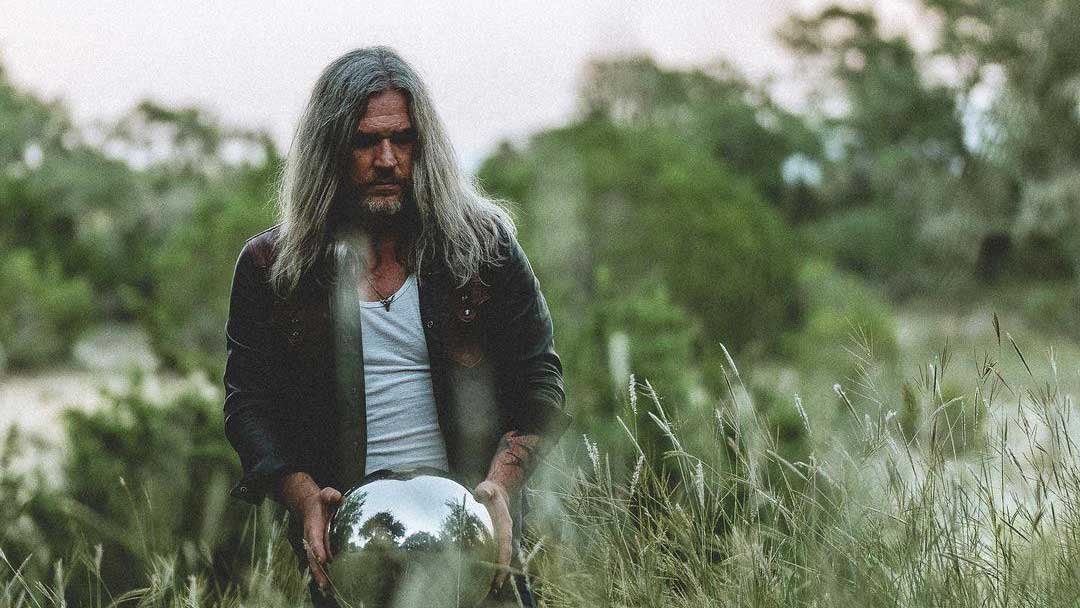"He ended up moving to Hawaii and living in the jungle in a tent for two decades": Israel Nash on the stories that inspired new album Ozarkers
With his new album Israel Nash is following in the footsteps of the great songwriters for whom the American heartland is a rich inspiration, who re-told tales passed down generations

Had he lived, Tom Petty would have turned 73 last year. On October 20, to be precise. Not uncoincidentally, Israel Nash chose that date in 2023 to release his latest album, Ozarker. A windows-down rock’n’roll album, pumped by surging guitars and ruggedly anthemic choruses, Nash’s collection of songs is a deliberate nod to the kind of heartland rock that Petty and his band the Heartbreakers excelled at.
“I just wanted to do something different on this record,” Nash explains to Classic Rock, at home in his adopted home town of Dripping Springs, Texas. “In recent years I’ve explored the realms of folk-psych and other places, but some of my earlier work was more rock’n’roll and straightforward, punchy stuff. And I was kind of missing Tom Petty, which then got me deeper into records that I’ve always loved.
“I was looking at that mid-to-late-eighties period, stuff that still holds up: Springsteen’s Born In The USA or Tunnel Of Love, and Bob Seger’s catalogue is incredible, he’s so underrated as a songwriter. I saw Seger just before the pandemic, on his farewell tour. So it was kind of like research by osmosis.”
Not that Ozarker is some cosy exercise in simple, youthful nostalgia. Nor is it a stylistic turn for its own sake. Instead, 42-year-old Nash is reaching deep into his roots, both musically and personally. Born and reared in smalltown Missouri, Nash belongs to a whole family of Ozarkers that spans generations. The characterful tales of his ancestry, most of them passed down from his mother, now bleed into the album’s grooves.
“I realised that I am from the heartland,” he reasons. “The stories and music from that part of the country have all shaped me. And those stories were the inspiration for this record. So from the start I dived deeper into them. I really worked at chiselling the songs and lyrics.”
Ozarker’s freewheeling title track examines the life of Nash’s great-grandfather, Thomas, a free-spirited migrant worker who fell for the daughter of a wealthy orchard owner. Forced to seek employment elsewhere for a year, he vowed to marry her upon his return, which he duly did.
“It’s an amazing story,” Nash offers. “Just a guy who’s working in the fields, kind of a roamer who plays music, marrying the upper-middle-class girl from a good family. It’s very American in that these people just got together and made it work.”
Sign up below to get the latest from Classic Rock, plus exclusive special offers, direct to your inbox!
Then there’s Going Back, a cinematic outlaw drama that could easily have featured on a Sam Peckinpah film. Nash’s research into the notorious Jesse James, a fellow Missourian with possible links to his distant ancestors, led him to the lesser known Newton Gang.
“These guys were from Texas,” Nash says, “four or five brothers, who robbed small banks, but then did the biggest heist of all time on a US postal train during the 1920s. There’s a famous Time article, where one of them got caught robbing a bank in his eighties, in one last kind of run. So that was a really fun song to write. I just wanted to make this real story about the bond between brothers. I felt I could really get behind that to paint a pretty deep picture.”
But the album is steeped in more than just mythology. These are also songs that deal with struggle and despair, of hardship and escape. One of its most powerful and affecting moments is Lost In America, a song that details the tragic story of a returning Vietnam soldier too traumatised to adapt back to everyday life.
"Nash Miller was a family friend of my mom’s brothers,” Nash explains. “Everyone loved him – handsome, athletic, full of life. Then he went to Vietnam and was never the same. My mom told me that whenever the screen door slammed at his house, he would hit the floor. He ended up moving to Hawaii and living in the jungle in a tent for two decades – no electricity, no running water, almost no human contact.
"They eventually found him in a jeep at the end of a ravine. It turned out that there were several hundred veterans in the Hawaiian jungles, all living like that, sleeping with one hand on a Bible and the other on a forty-five.”
The album closes with Shadowland, which traces the steady decline of certain facets of life in his native state.
“The Ozarks still feels like an untouched sort of place,” Nash explains. “So much is about the land and its shape – the mountains, the hills, massive oak trees shooting out, tons of rivers. But even before the opioid crisis, the Ozarks was the meth capital of the US. The business infrastructure of Middle America has changed so much over the past thirty or forty years, and some of these places have decayed.
"People often feel forgotten. There’s also poverty in rural areas, at larger levels. So there’s addiction, and the idea of being in this kind of shadowland, feeling your fate and not having control. That’s really what the song’s about."
Armed with a degree in political-science, Nash spent the early part of his musical career in New York City, before moving to Texas more than a decade ago. The vast skies and open spaces had a striking impact on his art, informing sweeping country-psych gems like 2013’s Rain Plans, the hallucinatory Silver Season (2015) and 2018’s Lifted, which recalled the cosmic inclinations of solo George Harrison tracks.
Dripping Springs may feel very much like home to Nash these days (he’s built his own studio space on a ranch there), but Missouri blood will always course through his veins. Part family album, part socio-cultural document, Ozarker has a lyrical scope that is both rich and vast. Much like its sound.
In true heartland fashion, these songs belong on big stages. Nash has managed to pull off the trick of turning the personal, the intimate, into the universal, locating familiar themes within these stories and inviting everyone to sing along until their lungs hurt.
“That’s what I’m really trying to encourage on this record, how all our experiences are linked somehow,” he concludes. “They shape how we are in the present. As a songwriter, I’m just sharing stories that are unique to me but are common to every damn person out there. We all come from somewhere, we all have hopes and dreams. Everyone has that same perspective: ‘This song was written for me.’ And that’s the beauty of all this stuff, right?”
Ozarkers is out now. Israel Nash is currently on tour in Europe, and kicks off a US tour on March 22. Dates and tickets.
Freelance writer for Classic Rock since 2008, and sister title Prog since its inception in 2009. Regular contributor to Uncut magazine for over 20 years. Other clients include Word magazine, Record Collector, The Guardian, Sunday Times, The Telegraph and When Saturday Comes. Alongside Marc Riley, co-presenter of long-running A-Z Of David Bowie podcast. Also appears twice a week on Riley’s BBC6 radio show, rifling through old copies of the NME and Melody Maker in the Parallel Universe slot. Designed Aston Villa’s kit during a previous life as a sportswear designer. Geezer Butler told him he loved the all-black away strip.

